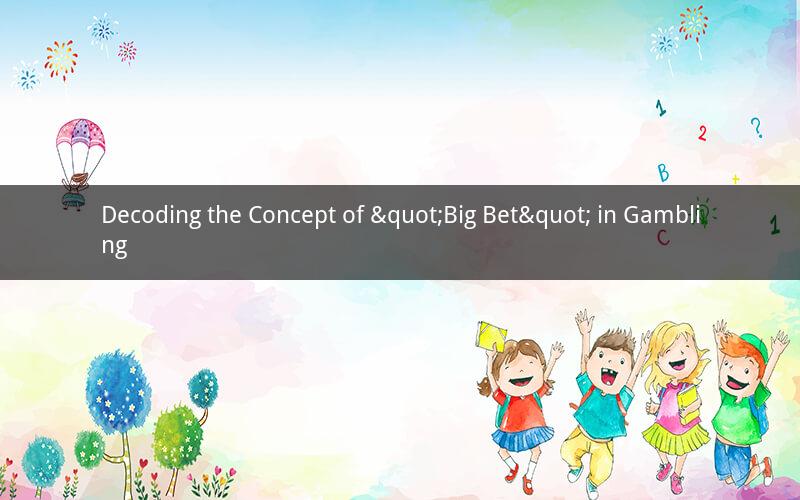
Introduction:
In the world of gambling, the term "big bet" holds a significant place. It refers to a substantial amount of money wagered on a single game or event. Understanding the implications and nuances of big bets is crucial for both seasoned gamblers and newcomers. This article delves into the meaning of big bets in gambling, their effects, and the psychology behind them.
What does a big bet in gambling mean?
A big bet in gambling signifies a substantial sum of money wagered on a single game or event. It can range from a few hundred dollars to several thousand or even more, depending on the player's budget and the type of game. The term emphasizes the size of the bet, highlighting the magnitude of the potential win or loss.
The effects of big bets in gambling:
1. Emotional Impact: Placing a big bet can evoke intense emotions, including excitement, anxiety, and fear. The anticipation of a substantial win can lead to exhilaration, while the fear of losing a significant amount of money can be overwhelming.
2. Financial Impact: A big bet can have a substantial impact on a player's finances. Winning a big bet can lead to significant financial gains, while losing can result in substantial financial losses. This can have long-term consequences, including financial instability and debt.
3. Influence on Decision-Making: Big bets can influence a player's decision-making process. The prospect of winning a large sum of money can lead to impulsive and irrational behavior, such as chasing losses or making risky bets.
The psychology behind big bets:
1. The Illusion of Control: Big bets often occur when players feel they have a higher chance of winning. This perception of control can be influenced by various factors, such as personal experiences or the odds of the game. However, it is important to remember that gambling is inherently a game of chance, and the outcome cannot be guaranteed.
2. The Gamblers' Fallacy: The gamblers' fallacy is the belief that past events can influence future outcomes. For example, if a player has lost a big bet, they may be more inclined to place a bigger bet in an attempt to recover their losses. This fallacy can lead to a cycle of big bets and increasing financial risk.
3. The Power of Perception: The perception of a big bet can vary among individuals. For some, a big bet may be a few hundred dollars, while for others, it could be several thousand. The psychological impact of a big bet is closely tied to the player's personal financial situation and their perception of the value of the money.
Frequently Asked Questions about Big Bets in Gambling:
1. What is the difference between a big bet and a small bet?
A big bet is characterized by a substantial amount of money wagered on a single game or event, while a small bet involves a smaller sum of money. The key difference lies in the size of the bet and the potential financial impact.
2. Can a big bet lead to addiction?
Yes, a big bet can contribute to gambling addiction. The allure of winning a substantial amount of money can be addictive, leading to increased risk-taking behavior and potential financial and emotional problems.
3. Are big bets always risky?
Big bets can be risky, but the level of risk depends on various factors, including the player's financial situation, the odds of the game, and their personal risk tolerance. It is essential to assess these factors before placing a big bet.
4. Can a big bet result in a significant financial loss?
Absolutely. A big bet can lead to substantial financial losses, especially if the game or event does not go as anticipated. It is crucial to gamble responsibly and only with money that can be affordably lost.
5. How can one minimize the risks associated with big bets?
To minimize the risks associated with big bets, it is essential to:
- Set a budget and stick to it.
- Avoid chasing losses.
- Understand the odds of the game.
- Seek support from friends, family, or professionals if struggling with gambling addiction.
Conclusion:
The concept of a big bet in gambling holds significant implications for players. Understanding its meaning, effects, and the psychology behind it can help individuals make informed decisions and gamble responsibly. Remember to always consider the potential risks and consequences associated with big bets, and never gamble with money that you cannot afford to lose.